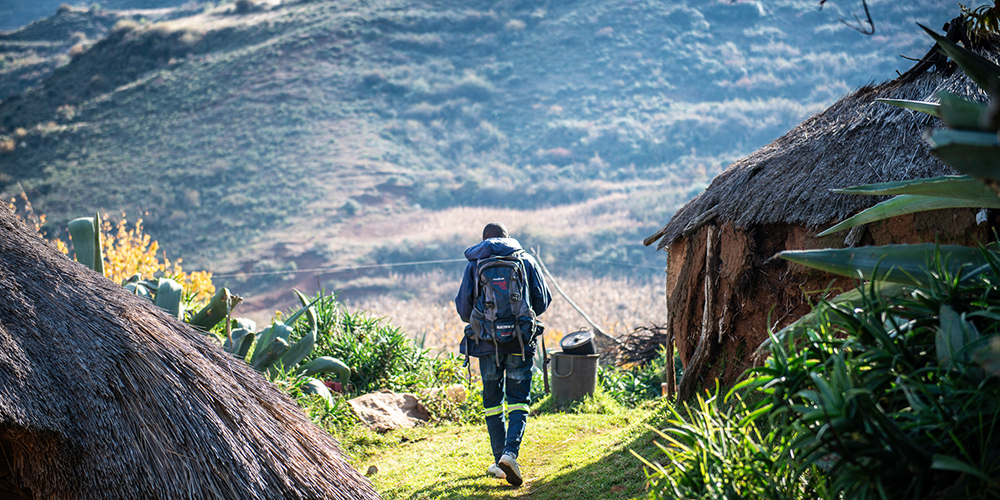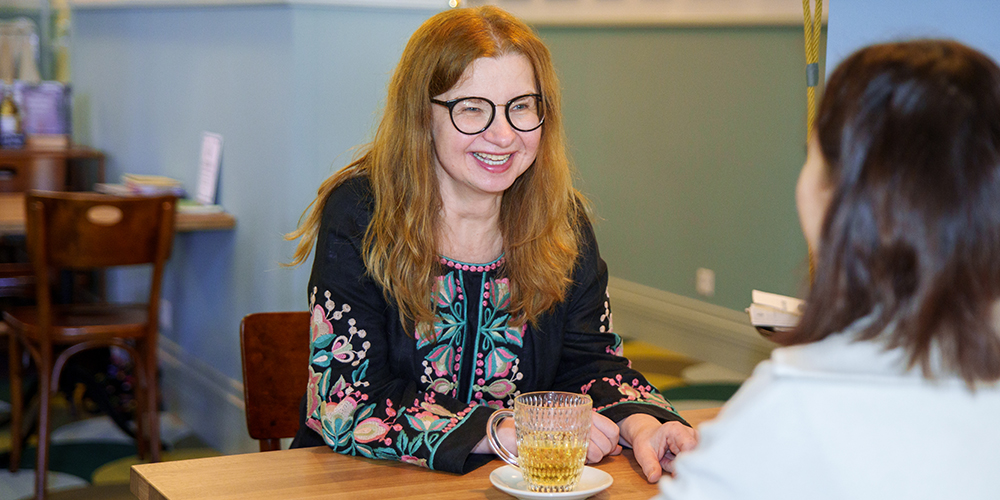“We need to include African voices and perspectives.”
Basel University Library’s “Deal with it” exhibition is dedicated to the relationship between Basel and Africa. Project director Reto Ulrich speaks with us about Basel’s colonial influences, recent societal changes, and why he sees cause for hope.
05 October 2023 | Noëmi Kern
Mr. Ulrich, what is the history of Basel’s interest in Africa?
Reto Ulrich: There was a strong taste for exploration and a great deal of interest in travel narratives in the 19th century, and this was the case in Basel as well. In the early and mid-20th century in particular, a network developed with the establishment of institutions such as the Swiss Tropical Institute and “Basler Afrika Bibliographien” that still exists to this day. This set the foundation for what we still have in Basel – a noteworthy collection of strong institutions with supra-regional appeal focusing on the African continent. One source of this is the biographies of particular individuals who passed on their fascination with Africa to others and looked for like-minded colleagues.
Basel’s encounter with Africa did not happen on equal terms. There were disparities between Western Europeans and Africans...
The interest had colonial overtones. There was no awareness at all of the problems with this approach, which existed for many hundreds of years. There was also no feedback because the people who were affected had no voice until the second half of the 20th century. Even today, there is often surprisingly little awareness of how perspectives associated with Africa are often problematic because they have never been questioned, especially in Switzerland. Switzerland did not have any of its own colonies, but there is a colonial history here nonetheless – the connections of the Basel bourgeoisie to the slave trade, for example. But there is a lack of institutional confrontation with this history, and the topics of decolonization, restitution and provenance research get little attention. And this, in turn, inhibits reflection on the past.
What are your goals for this exhibition?
First of all, the goal of the exhibition cannot be to offer answers to questions as challenging as “How can we fairly compensate for injustices?” or “How can a historical injustice be made right?” I think our society will continue to struggle with these questions for a long time. With this exhibition, we hope to encourage people to confront these questions. The institutions on display have been addressing their own history for years. The cultural program also shows that there are many wonderful approaches to these topics in areas such as art, music, theater and science. Sensitization has increased greatly in recent years and we want to play a role in the continuation of this process. I think we are fundamentally on the right path.
Who is the target audience for the exhibition?
We kept asking ourselves that question as we were developing it. The University Library is the heart of the academy and the university places an emphasis on academic studies of Africa with the Center for African Studies. So on one hand we are interested in addressing an audience of experts. On another level, we also want to raise awareness of Basel’s colonial history. There is also a casual audience without any background expertise at the University Library. So to ensure accessibility to a wider audience, we decided on German as the language for the exhibition. There is also an accompanying booklet in English. Inclusion and exclusion are a particularly important consideration when it comes to this topic.
Displaying content with colonial influences in this day and age may attract controversy. Some of the exhibits contain trigger warnings, and you ask visitors not to reproduce the stereotypes on display. What standards did you reference in designing the exhibition?
We were fortunate to have Elisa da Costa, who is half Swiss and half Angolan, as our co-curator. Her perspective was very influential. You can’t have an exhibition like this put on exclusively by white people from Switzerland. The inclusion of African voices and perspectives was of critical importance.
There is still very little awareness in our society of the effects that images, stereotypical portrayals and texts can have and the harm they can cause. We wanted to be sure we didn’t do this. It was important to us to create an exhibition in which people impacted by racism would not be exposed to content they don’t want to see. They should at least have the opportunity to decide for themselves. That is the reason for the trigger warnings. Ten years ago, an exhibition like ours would still have included things that we intentionally leave out today. Our sense of what can be appropriately displayed in public spaces in accordance with certain ethical principles has come a long way.
A glossary explains various terms in relation to Africa, including how their use is acceptable or problematic. It’s not always easy to avoid causing offense...
I myself have been working at “Basler Afrika Bibliographien” for 17 years and I still find this area difficult to navigate. Language and ideas are constantly changing. What I really came to understand while working on this project is how crucial it is to listen to those who are affected. It’s not a matter of what you perceive to be racist because you aren’t the one affected. As members of privileged groups, it doesn’t hurt us at all to replace terms that affected groups perceive as defamatory or insulting. It’s about getting rid of what harms people without privilege to protect those who are affected. And I think we can quickly come to a consensus when we see it this way. This has nothing to do with being woke – it’s all about relying on common sense.
What is the relationship between Basel and Africa today?
There is no single answer to that question. Growth is fundamentally taking place, and there are wonderful initiatives that aim to raise awareness of problematic issues and combat racism. The African diaspora in Basel has also become more and more visible in recent years. Systemic racism still exists in many parts of society, though, with diminished chances of landing a job or an apartment for people with a non-Swiss last name, for example, or racial profiling by the police. This is especially evident in the “Network” section of the exhibition. The people affected are fighting this. They want to be heard and they are getting louder. That gives me hope, even if these changes take a long time. I view the changes over the last 10 to 15 years as encouraging. The fact that this topic has been gaining momentum for some time – that things can change and the number of positive examples is increasing – this makes optimistic.
Digital portal for African research collections
Created in tandem with the exhibition, the Portal for African Research Collections (PARC) provides a catalog of African research collections in Basel. It includes the collections of the University of Basel, Mission 21, Basler Afrika Bibliographien, the Swiss TPH, and the Museum of Cultures Basel. Besides bibliographical and archival collections, it also lists ethnographic objects, photographs, posters, films and videos, audio recordings, and digital collections (incl. audiovisual media). The portal can help identify materials for student papers, theses, and other research. “The important thing is that it is used and we get feedback,” says Reto Ulrich. “I would encourage everyone who is involved with African Studies to take a look at it.”
The Deal with it – African heritage in Basel exhibition will remain on display in the Basel University Library exhibition space until November 16. Opening hours: Monday–Friday, 8:00 am–8:00 pm; Saturday, 10:00 am–8:00 pm. Admission is free.




